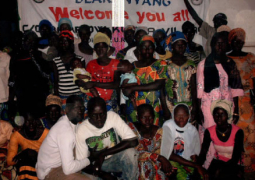The National Occupational Health and Safety Unit of the Ministry of Health and Social welfare, in collaboration with the World Health Organisation on Monday convened a three-day meeting with stakeholders on the finalisation of the draft health and safety policy, at the National Nutrition Agency conference room.
Speaking at the three-day meeting, the Deputy Permanent Secretary for Technical at the Ministry of Health and Social Welfare, Dr. Omar Sey stated that the occupational health and safety unit has done well in the area of promoting good and decent practices at work places. This, he added, will no doubt contribute immensely towards improving and preventing work related accidents, risks and hazards.
According to him, the unit was established in 1996, with the aim and objective of improving and maintaining decent and healthy workforce, regardless of sex, age, occupation, race, religion, size or location at work place. Dr. Sey added that many problems related to public and environmental health exist in The Gambia.
"The country struggles to combat diseases related to deficiencies in basic needs, such as water supply and sanitation, food and essential health care services," he said, adding that maternal and infant mortality, tuberculosis, malaria, HIV/AIDS and other infectious diseases take precedence over allocating medical resources to the workplace.
He noted that the issue of occupational health is higher on international agenda as occupational hazards claim more victims throughout the world than wars, and thereby affect the work force. "Hundreds of millions of people globally are working today under conditions that do not only impose ill-health, but are also unsafe," Dr. Sey said.
For his part, Sanna Jawara, acting Chief Public Health Officer at the Ministry of Health, said the emergence of new technologies and the expansion of trade and financial regimes have transformed formal employment in the informal sector.
"In the future, self-employment and the informal sector are expected to be more important in both developing and industrialised countries," he said, adding that workers in mining, forestry, construction and agriculture are faced with increased risks.
"Many of them suffer from occupational injuries and diseases, which lead to disability and premature death," he stated.
According to him, HIV/AIDs pandemic in the African region threatens the health and livelihood of the workforce.


